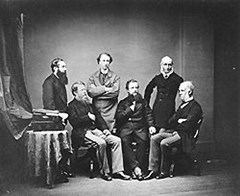Canada’s first Prime Minister John A. Macdonald, standing 2nd from left. Macdonald had been elected in 1844 to the legislature of the British Province of Canada, becoming its first Premier in 1857, and playing a leading role in conferences regarding Confederation of July 1, 1867! He was then elected Prime Minister of the new Dominion of Canada. Meanwhile, from 1861 to 1865, south of the border a civil war had been raging between the North and the South of the New England (American) colonies. There were some fears in Canada that once the fighting was over, the politicians with expansionist leanings of the New England colonies would turn their eyes northward, dreaming of possessing all the British territories of North America. An American journalist had coined the fanciful term “Manifest Destiny” to describe this off and on dream --based on the idea that the American people were living the righteous and ideal democratic life and this philosophy should be spread throughout the whole continent. However, this philosophy was more difficult to sell at war’s end in 1865, --it had hardly been an “ideal” after both sides had suffered the devastation of war. But, the Union—the North had some degree of anger towards Britain who had espoused neutrality at the beginning of the civil war, yet they had wanted to stay friendly with the South (Confederacy), even though they did not agree with the South’s slavery practices. But money talks, and since the southern states were important cotton producers—vital for Britain’s textile commerce, the cotton trade carried on. British ship builders constructed warships for the South, passing them off as merchant ships. When the war was over, the victorious North made claims for damages on the basis of Britain’s covert involvement—they had broken their promise of neutrality. At the Treaty meeting in Washington in 1871, it was deemed that Prime Minister J. Macdonald’s contribution in discussions and debates established the power of our new country. The results of the Treaty were seen to have been of major benefit for long term good relationships among the three countries.
Contact Terri Lefebvre Prince,
Heritage Researcher,
City of Yorkton Archives,
Box 400, 37 Third Avenue North
Yorkton, Sask. S3N 2W3
306-786-1722
[email protected]




